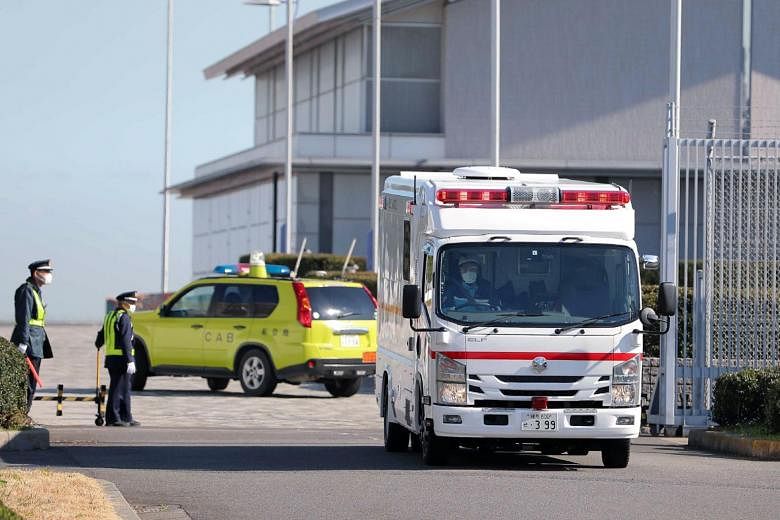TOKYO - Two Japanese citizens evacuated from Wuhan who refused to undergo tests for the new coronavirus have set off a political quandary in Japan over the evacuation mission, with debate centred on how the human rights of a minority should not supersede a potential health menace to society.
The two, who were among 206 nationals on Japan's first chartered flight out of the epicentre of the 2019-nCOV outbreak which landed at Tokyo's Haneda Airport on Wednesday, had displayed no symptoms at the airport and were "escorted home" after refusing to undergo further tests. Their actions came as three new cases of the virus were identified from the evacuees.
Prime Minister Shinzo Abe had to step in to calm nerves on Thursday (Jan 30).
"While quarantine officers did their best to persuade them to go for further tests, they refused, and unfortunately there is no legal basis to force them to do so," Mr Abe told the Diet, as Japan's Parliament is known. "There are some areas that the government is reluctant to forcefully step in because it encroaches on human rights. But from the second flight we should see how we can properly confirm the health status of all evacuees."
He stressed: "We will do our utmost to protect the lives and health of the people, and we will make decisions without hesitation."
While the new Wuhan virus has been named a "designated infectious disease" in Japan under a special law, it only allows the authorities to make compulsory the hospitalisation of confirmed patients.
This issue has flared up in Japan, stirring debate among Twitter users, who argue that upholding the human rights of two people should not be more important than averting a potential health menace to society.
The term "kensa kyohi" (rejection of inspection) is trending on the social media platform, with many calling the duo irresponsible and asking for details like where they live so that they can avoid the neighbourhood. Some have gone as far as to say that they should not have been allowed on the chartered flight in the first place.
Emotions are running high as Japan diagnosed its first cases with no visible flu symptoms on Thursday. These were among the 206 people who returned a day earlier.
The question, of whether people who have been infected but show no symptoms can still spread the virus, remains unresolved.
Among the 206, five had been immediately warded upon landing after they reported having a fever and cough. None subsequently tested positive for the Wuhan bug.
Of the other 199 who had agreed to further tests at the National Institute of Infectious Diseases (NIID), seven were hospitalised after flu symptoms were confirmed.
Among these seven, one 2019-nCOV case was found: a man in his 50s who had a runny nose and a sore throat. He subsequently developed a 38.7 deg C fever.
And among the remaining 191, two cases, a man and a woman in their 40s, had displayed no visible symptoms and were identified only through NIID tests. They have been quarantined.
Meanwhile, a second chartered flight, carrying 210 Japanese citizens, landed at Tokyo's Haneda Airport on Thursday. Of these, 13 people who had fever or cough have been hospitalised, public broadcaster NHK reported. Another 300 people who are still stranded in Wuhan want to return to Japan, the Foreign Ministry said. At least one more chartered flight is being planned.
Further, an Osaka tour guide in her 40s has also tested positive for the 2019-nCOV virus. The tour guide had worked with a previously-identified case - a Japanese bus driver in his 50s who lives in Nara prefecture - in leading a group of tourists from Wuhan from Jan 12 to 17. The group travelled from Narita Airport, to the east of Tokyo, to Kansai International Airport in Osaka. Both cases have no recent travel history to the virus-hit central Chinese city, and the Health Ministry said they were likely infected when travelling with the group of tourists.
The government is doing urgent contact tracing to identify any people who have come in close contact with the tour group, including in Yamanashi prefecture near Mount Fuji and in Osaka.
Japan now has a total of 11 confirmed cases of the virus.












